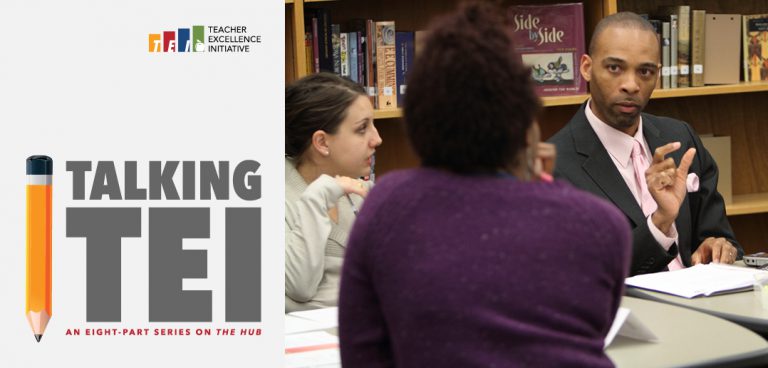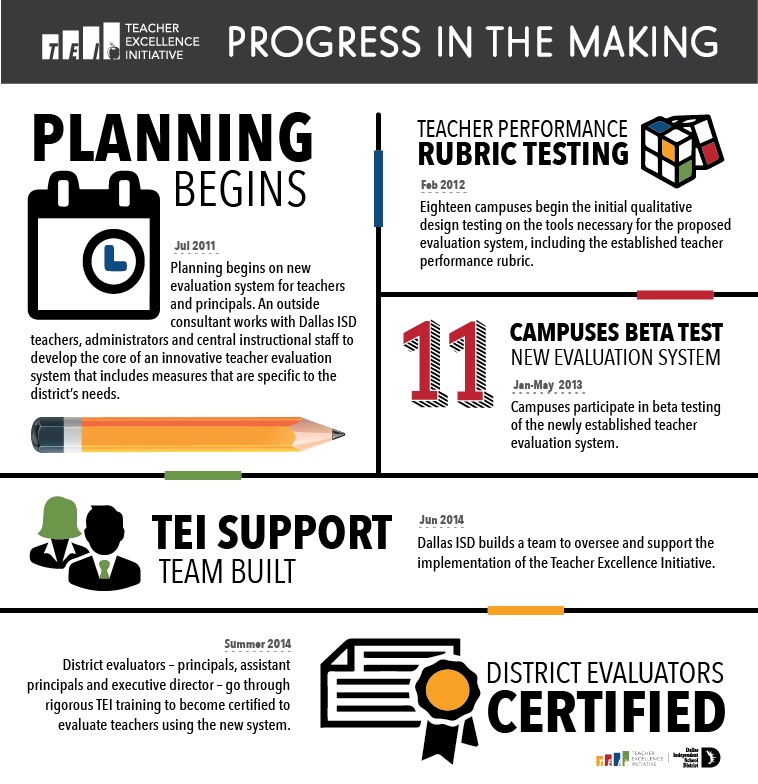The groundwork for Dallas ISD’s innovative Teacher Excellence Initiative comes from the understanding that the one-dimensional nature of traditional evaluations fails to acknowledge the hard work, long hours and personal commitment required of an effective teacher. The Texas Education Agency’s recent mandate to replace the Professional Development and Appraisal System (PDAS) reinforces the inability of conventional evaluations to reflect the actual effect teachers have on their students.
In 2009, a project funded by the Bill and Melinda Gates Foundation began in more than 3,000 classrooms across the U.S., including some in Dallas ISD. The MET (Measures of Effective Teaching) Project started with the knowledge, obtained through numerous studies, that only by using multiple measures can school leaders effectively evaluate a teacher’s contribution to student success. The MET set out to define those measures.
When Dallas ISD started researching the most reliable and valid way to determine teacher effectiveness, the work began with the findings of the MET Project as a foundation. The multi-year research partnership involved seven of the largest public school districts in the country, lead researchers from universities such as Harvard and Stanford, and non-profit and education companies.
In 2011, Dallas ISD brought in the independent District Management Council (DMC) to engage stakeholders in developing a new teacher evaluation system. The committees, comprising teachers, principals, school leadership and industry and community volunteers, worked together to create a teacher-performance rubric based on the findings of the MET Project, but specific to the district’s needs.
MET Project findings include:
- A high quality classroom observation system requires a list of key considerations created with the unique needs of individual districts in mind;
- Surveying students about their classroom experience provides important information not only about teaching effectiveness, but also feedback that can help teachers improve;
- Measures that take into account students’ different starting points can effectively identify those teachers who best help students learn;
- Confirmation that multiple measures result in more consistent performance ratings than reviewing student achievement or teacher performance alone;
- Combining individual measures helps identify different aspects of effective teaching, instead of looking for the same quality in all teachers.
Even though extensive research was incorporated into the planning and creation of the plan, district leadership understood that in order for the system to be as fair and accurate as possible, it must be viewed in action. In 2012, 18 Dallas ISD schools participated in the first beta test of the newly developed evaluation methods, including the teacher-performance rubric, observation tools, peer observation and student feedback processes.
After reviewing feedback from the initial beta test, a complete teacher evaluation system was developed. A second beta test on 11 campuses in 2013 collected more extensive feedback on the performance component, including spot observations, extended observations, and feedback conferences. Feedback from both beta tests was used to further refine the new system, and prepare a formal proposal for approval.
In May 2014, the Board of Trustees approved the Teacher Excellence Initiative (TEI) as the new teacher evaluation system for the district, with the 2014-2015 school year seeing its official launch. In response, Dallas ISD created a TEI team to support implementation of the system.
Over the summer of 2014, district evaluators – principals, assistant principals, instructional support staff, and executive directors – went through rigorous training to become certified to evaluate teachers using the new system. Only those evaluators who passed a calibration test were fully certified to conduct evaluations. To maintain the integrity of TEI evaluations, evaluators must be recertified each year.
While many well-researched studies formed the foundation for TEI, the program will change over time with input from teachers and principals. To encourage continuous feedback, principals identified TEI campus experts to share information with peers, provide input and influence decisions to improve the system.
According to TEI Operations Manager Betsy Cook, “the TEI Campus Expert voice is an important one as we continue to improve TEI to best serve our district. Many of the improvements we incorporated into year two are because of their work.”
Talking TEI is an eight-part series that dives into the nuts and bolts of the district’s new teacher evaluation system.
Part 1: Welcome to Talking TEI
Part 2: Ed talk with Dr. Bravo: TEI scorecards
Part 4: Under TEI, teachers have potential to earn higher salaries than previously


